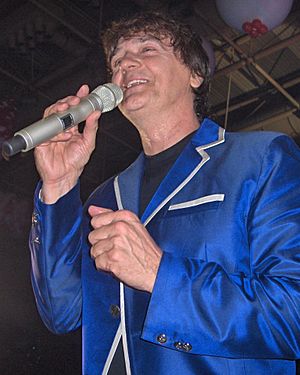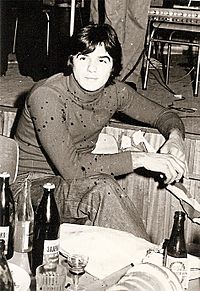Zdravko Čolić facts for kids
Quick facts for kids
Zdravko Čolić
|
|
|---|---|

Čolić performing in 2007
|
|
| Born | 30 May 1951 |
| Other names | Čola, Zdravko, Dravco |
| Occupation |
|
| Years active | 1967–present |
| Spouse(s) |
Aleksandra Aleksić
(m. 2001) |
| Children | 2 |
| Musical career | |
| Genres | |
| Instruments |
|
| Labels |
|
| Associated acts |
|
Zdravko Čolić is a famous pop singer from the former Yugoslavia. He was born on May 30, 1951. Many people think he is one of the best singers and cultural icons from that time.
Music critics often compare his voice to famous singers like Paul McCartney and Tom Jones. He is known for his strong, emotional voice and great stage presence. He has released many popular albums and songs. One of his most famous songs is "Ti si mi u krvi" (You're In My Blood).
Contents
Early Life and Interests
Zdravko Čolić was born in Sarajevo, which was then part of Yugoslavia. His father, Vladimir, was a police officer, and his mother, Stana, was a homemaker. He grew up with his younger brother, Dragan.
When he was young, Zdravko loved sports. He played as a football goalkeeper for a youth team. He was also very good at track and field, especially in the 100-meter dash and long jump. He even ran 100 meters in just 11.3 seconds! However, he decided not to pursue a sports career because he felt he didn't have enough discipline.
Zdravko went to elementary school in Sarajevo and also studied guitar at a music school. He enjoyed performing in school plays and recitals as a hobby.
Starting His Music Journey
First Steps in Music
From a young age, Zdravko was very interested in music. He and his friend Braco Isović would play guitar together in their neighborhood. They became known as 'Čola and Isa from Grbavica'. At that time, Zdravko wanted to sing pop music, like the songs popular at festivals in Yugoslavia and Italy.
His first public singing experience happened in 1967. He was on vacation with his family in Baošići, a coastal town. A friend convinced him to join an amateur singing competition in nearby Bijela. Zdravko, who was seventeen, won second prize by singing "Lady Madonna" by The Beatles.
This success encouraged him to join his first band, 'Mladi i lijepi'. He stayed with them until he finished high school in 1969. After that, he joined a more established band called Ambasadori.
Joining Ambasadori
When Zdravko joined Ambasadori, it was a unique band. Most of the musicians were army officers, except for the bandleader, Slobodan Vujović. They mostly played cover songs by artists like Chicago and Otis Redding. They also played popular Yugoslav songs and some of their own music.
Because the army musicians weren't always available for gigs, Zdravko and Slobodan decided to form a new version of the band in 1970, called Novi Ambasadori. They added new members and expanded their music to include songs by Led Zeppelin and Creedence Clearwater Revival. In the summer of 1970, they performed in Dubrovnik for a month, which was their first tour-like experience.
In 1971, Novi Ambasadori competed at a festival in Sarajevo called Vaš šlager sezone. They finished in 7th place with their song "Plačem za tvojim usnama". This performance was important because it was their first time on television, reaching a much larger audience. A famous musician named Kornelije Kovač saw Zdravko perform and was impressed by his clear voice and stage presence.
Time with Korni Grupa
In the summer of 1971, Kornelije Kovač invited Zdravko to join his band, Korni Grupa. This band was different from Ambasadori because they played their own original music and were very serious about it. Zdravko was excited about this opportunity.
On September 10, 1971, Zdravko, then twenty years old, moved from Sarajevo to Belgrade to join Korni Grupa. However, his time with the band was short. He found it hard to fit into their progressive rock style. He recorded three songs with them, but they weren't very successful. One song, "Gospa Mica gazdarica," caused a small stir because of its lyrics, and it was removed from some radio stations.
After only six months, Zdravko and Kornelije agreed that it would be better for Zdravko to start a solo career. He returned to Sarajevo, ready to try singing on his own.
Zdravko's Solo Career
Early Solo Success
On April 15, 1972, Zdravko began his solo career by competing in the Vaš šlager sezone festival again. He won third prize from the audience and an award for his singing. He performed the song "Sinoć nisi bila tu," which was written by Kemal Monteno.
With Kornelije Kovač's help, Zdravko quickly became a popular solo artist. He appeared on a popular TV show and performed at several other festivals. In 1973, he went on a tour of the Soviet Union with other famous Yugoslav musicians.
Eurovision and More Festivals
Zdravko's big break came when he won the Opatija festival with the song "Gori vatra." This win meant he would represent Yugoslavia at the 1973 Eurovision Song Contest in Luxembourg City. Although the song didn't place very high, it became a huge hit back home.
After Eurovision, Zdravko continued to enter many music festivals across Yugoslavia. He had a lot of success, winning with songs like "Ona spava" (1974), "April u Beogradu" (1975), and "Zvao sam je Emili" (1975). These songs were all composed by Kornelije Kovač.
Around this time, he also signed a deal with a German record label, WEA. They called him Dravco because they thought his name was too hard to say. However, Zdravko decided not to move to Germany and continued his career in Yugoslavia.
First Albums and Huge Popularity
His first solo album, Ti i ja (You and I), was released in 1975. It included popular songs like "Vagabund" and "Loše vino." Zdravko's image, especially his appeal to girls and women, became a big part of his career. That same year, a compilation of his festival songs was released.
In 1977, his second album, Ako priđeš bliže (If You Come Closer), was even more successful. It caused a huge excitement among his fans. The album sold 50,000 copies in just two weeks! It featured some of his most loved songs, such as "Glavo luda," "Zagrli me," and "Pjevam danju, pjevam noću."
On April 1, 1978, Zdravko started a massive tour across Yugoslavia with the Lokice Dance Group. This tour, called "Traveling Earthquake Tour," became a huge event. Girls would scream and rush the stage at every concert. The biggest show was in Belgrade at the Red Star FC stadium on September 5, 1978, with 70,000 people attending. This concert was so big that a documentary film, Pjevam danju, pjevam noću (I sing during the day, I sing at night), was made about Zdravko's career and the tour. By the end, the album sold over 700,000 copies.
After this incredible success, Zdravko served his mandatory time in the Yugoslav People's Army. He returned to music in 1979.
Music in the 1980s and Beyond
After returning from the army, Zdravko released his third album, Zbog tebe, in 1980. This album brought more hits and solidified his position as Yugoslavia's most popular pop performer.
In 1984, Zdravko moved to Ljubljana and started a business with Goran Bregović. He then lived in Zagreb for five years before moving back to Belgrade in 1989. His song "Jastreb" was a big hit in 1988.
After his 1990 album, "Da ti kažem šta mi je," Zdravko took a break from releasing new music. He made a big comeback in late 1997 with the album Kad bi moja bila, and quickly regained his popularity. The next year, he performed nine sold-out concerts at Sava Centar.

In October 2005, Zdravko performed two concerts at the Belgrade Arena. In 2008, he even voiced a character in the Bosnian version of the Pixar movie WALL-E.
In 2010, he had a huge concert at the Asim Ferhatović Hase Stadium in Sarajevo, with over 60,000 fans. On June 25, 2011, he held his biggest concert ever at Ušće in Belgrade, with more than 100,000 visitors. This concert celebrated his 40-year career.
Personal Life
When the Bosnian War started, Zdravko Čolić moved to Belgrade, where he has lived ever since. He has a degree in economics from the University of Sarajevo. Zdravko is married to Aleksandra Aleksić, and they have two daughters.
Music Albums
Studio Albums
- Ti i ja (You and Me) (1975)
- Ako priđeš bliže (If You Come Closer) (1977)
- Zbog tebe (Because of You) (1980)
- Malo pojačaj radio (Turn Up the Radio a Bit) (1981)
- Šta mi radiš (What Are You Doing to Me?) (1983)
- Ti si mi u krvi (You Are in My Blood) (1984)
- Rodi me majko, sretnog (Birthed Me as a Lucky Man, Mother) (1988)
- Da ti kažem šta mi je (To Tell You What's Up with Me) (1990)
- Kad bi moja bila (If You Were Mine) (1997)
- Okano (2000)
- Čarolija (Enchantment) (2003)
- Zavičaj (Homeland) (2006)
- Kad pogledaš me preko ramena (When You Look At Me Over the Shoulder) (2010)
- Vatra i barut (Fire and Gunpowder) (2013)
- Ono malo sreće (That Bit of Luck) (2017)
Singles
- "Sinoć nisi bila tu" / "Tako tiho" (1972)
- "Stara pisma" / "Pod lumbrelon" (1972)
- "Gori vatra" / "Isti put" (1973)
- "Bling, blinge, blinge, bling" / "Julija" (1973)
- "Dome moj" / "Ljubav je samo riječ" (1974)
- "Ona spava" / "Zaboravi sva proljeća" (1974)
- "Zelena si rijeka bila" / "Ne dam ti svoju ljubav" (1974)
- "Madre Mia" / "Rock n roll himmel" (1974)
- "Zvao sam je Emili" / "Sonata" (1975)
- "April u Beogradu" / "Svitanje" (1975)
- "Alles was ich hab" / "Lampenfieber" (1975)
- "Ti si bila, uvijek bila" / "A sad sam ja na redu" (1976)
- "Ljubav ima lažni sjaj" / "Balerina" (1977)
- "Živiš u oblacima" / "Zašto spavaš" (1977)
- "Light me" / "I'm not a robot man" (1978)
- "Loš glas" / "Ne mogu biti tvoj" (1978)
- "Druže Tito, mi ti se kunemo" / "Titovim putem" (1980)
Live Albums
- Stadium Marakana (2001)
- Belgrade Arena (2005)
- Stadium Marakana (2007)
- Stadium Koševo (2010)
- Belgrade Ušće (2011)
Compilations
- Pjesme koje volimo (The Songs We Like) (1984)
- Poslednji i prvi (The First And the Last) (1994)
- Zauvek (Forever) (1998)
- Zauvek 2 (Forever 2) (1999)
- 7X Čola Box Set (2000)
- Balade (The Ballads) (2002)
- The Best of Zdravko Čolić (double-CD set) (2004)
- The Best of Zdravko Čolić (2008)
Tours
- Okano Tour (2001–02)
- Zavičaj Tour (2006–09)
- Kad pogledaš me preko ramena Tour (2010–13)
- Vatra i barut Tour (2014–17)
- Ono malo sreće Tour (2018–19)
See also
 In Spanish: Zdravko Čolić para niños
In Spanish: Zdravko Čolić para niños
 | Aaron Henry |
 | T. R. M. Howard |
 | Jesse Jackson |


